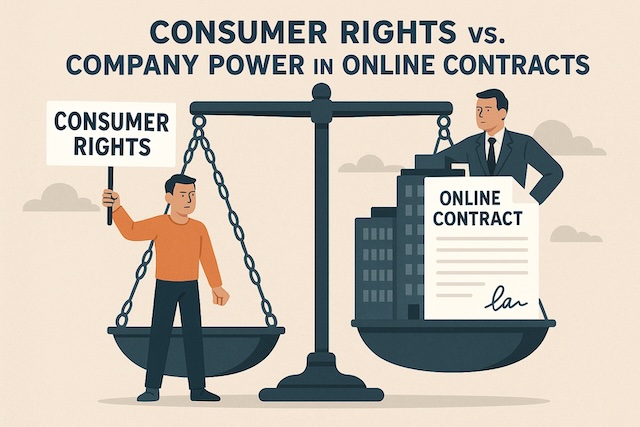We earn commissions when you shop through the links below
Most internet users never read Terms of Service (ToS) agreements, yet these documents function as binding contracts. For companies, ToS allocate risk, establish governing law, and limit liability. For consumers, they define the boundaries of rights and remedies.
This post outlines the most common provisions found in online contracts, explains their legal function, and identifies issues of enforceability.

1. Arbitration and Dispute Resolution
Purpose: Companies frequently require users to resolve disputes through binding arbitration rather than litigation. This minimizes exposure to class actions and limits costs.
Example Clause:
“Any dispute arising under these Terms shall be resolved through binding arbitration administered by the American Arbitration Association (AAA), with venue in [specific jurisdiction].”
Case Law:
- AT&T Mobility LLC v. Concepcion, 563 U.S. 333 (2011) — the Supreme Court held that the Federal Arbitration Act preempts state laws prohibiting class arbitration waivers, cementing arbitration clauses as enforceable in consumer contracts.
Practical Effect: Users often waive their right to sue in court or join class actions.
2. Limitation of Liability
Purpose: To cap damages that a company might owe in the event of loss.
Typical Language:
“In no event shall Company be liable for indirect, incidental, or consequential damages exceeding $100.”
Judicial Approach: Courts generally enforce reasonable limitations, especially in B2C contracts. However, clauses attempting to disclaim liability for gross negligence or intentional misconduct may be struck down as unconscionable.
3. Choice of Law and Forum Selection
Purpose: To establish the governing law and jurisdiction for disputes.
Example:
“These Terms are governed by the laws of the State of California. All disputes shall be litigated exclusively in the federal or state courts located in Santa Clara County, California.”
Case Law:
- Carnival Cruise Lines, Inc. v. Shute, 499 U.S. 585 (1991) — the Supreme Court upheld forum selection clauses in adhesion contracts if they are reasonable and not obtained through fraud or overreaching.
Practical Effect: Users may be forced to litigate far from their home jurisdiction, often creating a barrier to access.
4. Intellectual Property and User Content
Purpose: To govern ownership of platform content and grant companies licenses to use user-generated material.
Typical Language:
“By posting content, you grant Company a worldwide, non-exclusive, royalty-free license to use, reproduce, and distribute such content in connection with the service.”
Issues: Some terms grant perpetual or irrevocable licenses, raising concerns about user rights over personal data and creative works.
5. Modification Clauses
Purpose: To allow unilateral changes to terms.
Common Approach:
“Company reserves the right to modify these Terms at any time, effective upon posting.”
Enforceability Concern: Courts may find unilateral modification clauses illusory if there is no requirement of notice or acceptance.
- Douglas v. Talk America, 495 F.3d 1062 (9th Cir. 2007) — held that mere posting of new terms without notice was insufficient to bind users.
6. Termination of Service
Purpose: To give the company the ability to suspend or terminate accounts at its discretion.
Typical Language:
“We may suspend or terminate your access to the Service at any time, with or without cause or notice.”
Risk: Absolute discretion may be challenged as unconscionable, particularly if users have invested in digital assets or rely on the service for livelihood.
7. Data Use and Privacy
While privacy policies are often separate, many ToS include cross-references that incorporate data-handling practices. In jurisdictions subject to GDPR or CCPA, failure to disclose or obtain consent may expose businesses to regulatory enforcement.
Key Takeaways
- Arbitration, liability caps, and forum selection clauses are near-universal in ToS.
- Courts generally enforce these provisions if users are given adequate notice and opportunity to assent.
- The most vulnerable provisions are those involving unilateral modification, broad termination rights, or excessive IP grants.
In the next post, we’ll examine enforceability in practice — how courts analyze assent, notice, and fairness in online contracts.





